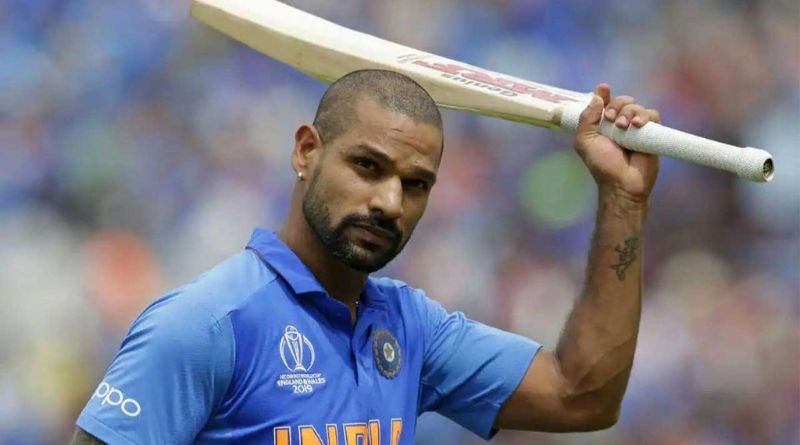Shikhar Dhawan, one of India’s most flamboyant and consistent opening batsmen, has officially announced his retirement from all forms of cricket. With this announcement, the cricketing world bids farewell to a player who has not only enthralled fans with his aggressive style of play but also made significant contributions to Indian cricket across all formats.
Table of Contents
The Beginning: A Star in the Making
Shikhar Dhawan was born on December 5, 1985, in Delhi, India. From a young age, his talent was evident. He first made headlines during the 2004 Under-19 Cricket World Cup, where he emerged as the highest run-scorer. His performances in the tournament were a clear indication that India had found a future star. However, despite his early success, Dhawan had to wait for nearly a decade to establish himself in the Indian senior team.
Breakthrough in International Cricket
Dhawan made his One Day International (ODI) debut against Australia in October 2010, but it was his Test debut in March 2013 that truly announced his arrival on the international stage. Playing against Australia in Mohali, Dhawan scored a blistering 187 off 174 balls, the fastest century by a debutant in Test cricket. This innings not only cemented his place in the Indian team but also showcased his aggressive intent and flair, qualities that would define his career.
A Pillar in Indian ODI Cricket
While Dhawan’s Test career had its highs and lows, it was in ODIs that he truly flourished. Partnering with Rohit Sharma at the top of the order, Dhawan became an integral part of India’s limited-overs setup. The duo formed one of the most successful opening partnerships in the history of ODI cricket, providing India with countless strong starts in key matches.
Dhawan’s performances in ICC tournaments were particularly noteworthy. He was the leading run-scorer in the 2013 ICC Champions Trophy, helping India win the title. He repeated his brilliance in the 2015 ICC Cricket World Cup and the 2017 ICC Champions Trophy, finishing as one of the top scorers in both tournaments. His ability to rise to the occasion in big matches made him a valuable asset for the Indian team.
T20 and IPL Success
In the shortest format of the game, Dhawan was equally effective. Although he played fewer T20 Internationals (T20Is) compared to ODIs, his impact was significant. His aggressive batting style was tailor-made for T20 cricket, where he could take the attack to the bowlers from the very first ball.
Dhawan was also a prominent figure in the Indian Premier League (IPL). Over the years, he played for several franchises, including Delhi Capitals, Sunrisers Hyderabad, and Mumbai Indians. His consistency in the IPL was remarkable, and he frequently finished among the top run-scorers in the tournament. His experience and leadership qualities were also evident, particularly during his stint as the captain of Delhi Capitals.
Challenges and Comebacks
Like any professional athlete, Dhawan faced his share of challenges. Injuries often disrupted his career, forcing him to miss crucial matches and series. Despite these setbacks, Dhawan always made strong comebacks, proving his resilience and determination. His ability to return to form after injuries or periods of poor performance was a testament to his mental strength.
Off the field, Dhawan was known for his positive attitude and infectious smile. He was a team player, always putting the team’s needs above personal milestones. His camaraderie with fellow players, particularly with his opening partner Rohit Sharma, was well-documented, and their partnership became a highlight of Indian cricket.
The Decision to Retire
Shikhar Dhawan’s decision to retire from all forms of cricket marks the end of an era. While the announcement might have surprised some, it was clear that Dhawan had been considering his future for some time. In recent years, his appearances for the national team had become less frequent, with younger players being given opportunities to prove themselves.
In his retirement statement, Dhawan expressed gratitude to his fans, teammates, and coaches who supported him throughout his career. He also thanked the Board of Control for Cricket in India (BCCI) for believing in his abilities and providing him with the platform to showcase his talent. Dhawan emphasized that while he was retiring from playing, his love for cricket would remain undiminished. He hinted at staying involved in the sport in some capacity, possibly as a mentor or coach.
Legacy and Impact on Indian Cricket
Shikhar Dhawan’s legacy in Indian cricket is undeniable. He leaves behind a rich legacy, particularly in ODI cricket, where he was one of the most reliable and explosive openers. His ability to dominate bowling attacks, especially in ICC tournaments, made him a match-winner on numerous occasions.
Dhawan’s contribution to Indian cricket goes beyond just his runs. He was a role model for younger players, both in terms of his work ethic and his approach to the game. His journey from a promising young talent to one of India’s most accomplished openers is an inspiration for many aspiring cricketers.
Moreover, Dhawan’s influence extended to the IPL, where he played a crucial role in popularizing the tournament and elevating its status. His performances in the IPL helped bridge the gap between international and domestic cricket, showcasing the immense talent present in Indian cricket.
The Road Ahead
As Dhawan steps away from professional cricket, the focus now shifts to what lies ahead for him. While he has not made any specific announcements regarding his future plans, it is expected that he will remain connected to the sport. Whether as a commentator, coach, or mentor, Dhawan’s experience and knowledge of the game will be invaluable.
For Indian cricket, the challenge will be to fill the void left by Dhawan’s departure. While the team has a pool of talented young players, finding someone who can replicate Dhawan’s consistency and impact will not be easy. However, Dhawan’s contribution to Indian cricket will serve as a benchmark for future generations of cricketers.
Conclusion
Shikhar Dhawan’s retirement marks the end of a glorious chapter in Indian cricket. His journey from a young, promising talent to one of India’s most successful openers is a story of perseverance, hard work, and passion. As fans, we can only thank him for the countless memories he has given us and wish him the best in his future endeavors. While he may no longer be seen on the cricket field, his legacy will continue to inspire future generations of cricketers.
FAQs
1. Why did Shikhar Dhawan retire from cricket?
Shikhar Dhawan retired from cricket after a long and successful career. While he has not cited specific reasons, it is likely that his decision was influenced by the emergence of younger players and his reduced appearances for the national team in recent years.
2. What were Shikhar Dhawan’s major achievements in cricket?
Dhawan’s major achievements include being the highest run-scorer in the 2013 ICC Champions Trophy, scoring the fastest century on Test debut, and forming one of the most successful ODI opening partnerships with Rohit Sharma. He also played a crucial role in India’s successes in various ICC tournaments.
3. How did Shikhar Dhawan impact Indian cricket?
Dhawan’s impact on Indian cricket is significant, particularly in ODI and T20 formats. His aggressive style of play provided India with strong starts in many matches, and his performances in ICC tournaments were instrumental in India’s success. He also played a vital role in popularizing the IPL and mentoring younger players.
4. What are Shikhar Dhawan’s future plans after retirement?
While Dhawan has not announced any specific plans, he has hinted at staying involved in cricket, possibly as a coach or mentor. His vast experience and knowledge of the game would make him an asset in any such role.
5. What was Shikhar Dhawan’s role in the IPL?
Dhawan was a key player in the IPL, representing several franchises over the years. He consistently finished among the top run-scorers and played a crucial role in his teams’ successes. His leadership qualities were also evident, particularly during his tenure as the captain of Delhi Capitals.



